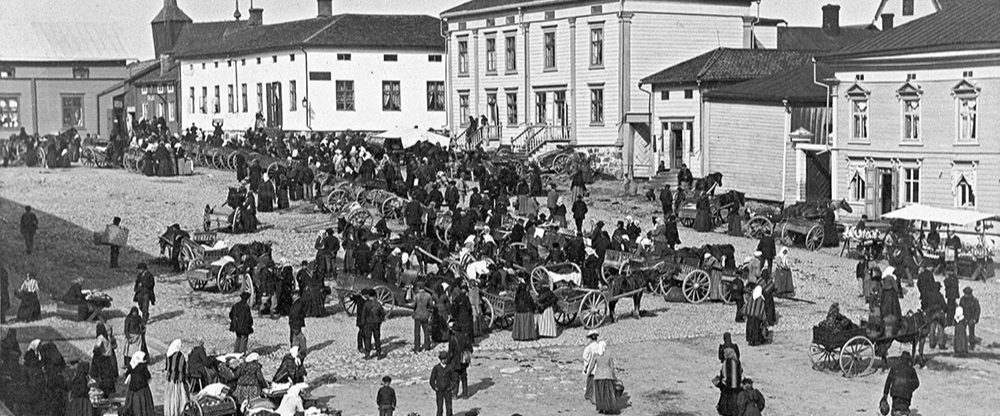”Dealing with Difference”: Peddlers, Consumers and Trading Encounters in Finland, 1840–1940
Funded by the Academy of Finland and the Kone Foundation
Principal investigator: Docent Ann-Catrin Östman, History, Faculty of Arts, Psychology and Theology, Åbo Akademi University
Itinerant trade has been, and still is, an integral part of social, cultural and economic life in many regions of the world. This form of commerce has particularly offered minority groups, such as migrants, ethnic minorities and women from the lower social classes important means of livelihood. In Europe, petty trade remained widespread until the early 20th century. The increase in consumption and the transnational flow of commodities in the late nineteenth century had wide cultural and social consequences that greatly affected social, ethnic and language relations. Peddling, consumption and the growth in trade had the capacity to simultaneously increase and decrease the gap between social groups, thus functioning as a laboratory of social contact. Yet, there is little research on how this ‘social laboratory’ operated in practice, and how the relations between minority peddlers and indigenous customers were shaped, realized, and understood.
The interdisciplinary project Dealing with Difference aims at filling this knowledge gap and traces the history of traders and consumers in Finland from the grand duchy of Russia to the full nation state, ca 1840–1940. By focusing on ethnicity, gender, class, and religion, the project emphasizes meanings of itinerant trade and of marketed commodities, as well as investigates practices, representations and experiences of both traders and consumers. The project addresses three main thematic subjects: 1) traders and commodities, 2) consumers and commodities, and 3) trading encounters.
Dealing with Difference follows sellers from different social, linguistic and ethnic backgrounds: Finnish- and Swedish-speakers alongside ethnic and religious minorities such as Roma, Russians, Karelians, Tatars, and Jews. An important aspect pertains to how these traders were regarded by society and by the customers, they met. Were they constructed as ‘strangers’ (Simmel 1908), as ‘different’, as ‘ethnic others’, and if not, then how were they depicted? Some groups of peddlers may have been seen as welcome guests in local communities, while others were conceptualized as ‘pariah’ (Blok 2001). In order to answer these and other questions, the project draws on a variety of materials and sources, such as public writings (e.g. newspapers), ethnological questionnaires, popular descriptions, oral-history interviews, fiscal and legal sources, police archives, reminiscences, illustrations, photographs, fiction and memoirs. The interdisciplinary approach combines ethnological approaches, historical sociology, approaches from gender studies and archival studies, microhistory, cultural history and folklore studies. Mixing methods allows us to explore textual representations, written experiences, as well as discursive practices.
The theoretical premise of Dealing with Difference is that situated practices and materiality are fundamental to social relations. We rely on three interlinked theoretical perspectives. Our main theoretical approach is Georg Simmel’s (1908) concept of ‘the stranger’, which we use to capture operations of cultural distance, but also to highlight the economic features of trading encounters. Secondly, the project applies an intersectional feminist framework in order to show how social differences were created in interaction between various hierarchies. Thirdly, we draw on theories of material culture, and look at the meanings given to the commodities, goods, the things for sale.
Dealing with Difference sheds new light on Finnish minorities and offers important understandings of the complex ways ethnic minorities have been perceived, constructed and experienced in Finland during 1840–1940, at a time of intense modernization and nation-building. Therefore, the project also addresses the Finnish history of racism. The notion of ‘difference’ is crucial, and the project contributes to the theoretical understanding of ‘the stranger’ by gendering and ethnifying the concept. By tracing the voices of the traders themselves, we aim at offering an ethically sound and a more complex outlook of what it meant to be a peddler. In this way, the projects provides new insights to the history of subordinate groups.
Researchers:
PhD Ann-Catrin Östman (PI)
PhD Jutta Ahlbeck
Ph. lic. Niklas Huldén
PhD Hanna Lindberg
PhD Eija Stark
PhD student Anna Sundelin
PhD student Sandra Waller
PhD Johanna Wassholm
